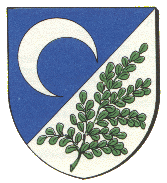Tagolsheim: Difference between revisions
Jump to navigation
Jump to search
Knorrepoes (talk | contribs) m (Text replace - "Armorial de France, Armoires, Blason" to "Armorial de France, Armoiries, Blason, Héraldique, Armes") |
Knorrepoes (talk | contribs) m (Text replace - "[[Literature" to "{{media}} [[Literature") |
||
| Line 14: | Line 14: | ||
The crescent appeared on ancient borderstones, the oldest dating from 1625. The lower half shows a type of tree, Buchs in German (boxwood), and symbolises the Buchsberg mountain in the municipality, which was first mentioned in 1345. The inhabitants of Tagolsheim are also nicknamed Buchskopfe (or Buchs-heads). | The crescent appeared on ancient borderstones, the oldest dating from 1625. The lower half shows a type of tree, Buchs in German (boxwood), and symbolises the Buchsberg mountain in the municipality, which was first mentioned in 1345. The inhabitants of Tagolsheim are also nicknamed Buchskopfe (or Buchs-heads). | ||
{{media}} | |||
[[Literature]] : Image taken from [http://cdhf.telmat-net.fr/villages here], with permission. | [[Literature]] : Image taken from [http://cdhf.telmat-net.fr/villages here], with permission. | ||
Revision as of 06:36, 9 July 2014
| Heraldry of the World Civic heraldry of France - Armorial de France |
TAGOLSHEIM
Département : Haut-Rhin
Origin/meaning
The arms were adopted in 1974.
The crescent appeared on ancient borderstones, the oldest dating from 1625. The lower half shows a type of tree, Buchs in German (boxwood), and symbolises the Buchsberg mountain in the municipality, which was first mentioned in 1345. The inhabitants of Tagolsheim are also nicknamed Buchskopfe (or Buchs-heads).
Contact and Support
Partners:
Your logo here ?
Contact us
© since 1995, Heraldry of the World, Ralf Hartemink 
Index of the site
Literature : Image taken from here, with permission.











